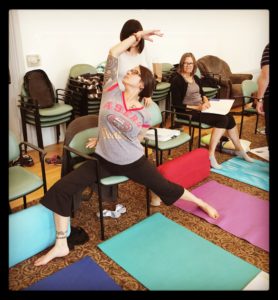By K. Muktidevi Demafeliz
I was diagnosed with Multiple Sclerosis (MS) in October 1998 when I was 18 years old. I recently turned the BIG 4-0 and am currently facing a change in my condition. In August 2018, I took a true LEAP OF FAITH. I was on the Avonex injections taking a weekly shot every Friday for the last 20 years, but had to change up my game. I really took the time to think about all of the possibilities and eventually trusted my decision to transition to a different medication, an infusion therapy known as Rituxan (twice a year infusion vs. 52 shots a year). It’s too early to tell if it’s going to work for me or if it will help in the long run, but I am truly hoping for the best. *hands in prayer*
MS is known as the “invisible illness” as symptoms vary from patient to patient. Intermittent symptoms, visible and invisible, include fatigue, unsteady gait, impaired balance, disrupted walking and fine motor control of the fingers, pain, numbness and tingling feelings, bladder and bowel control, heat sensitivity, memory and cognitive issues, depression, speech and vision impairment, trouble with swallowing, and other neurological symptoms that affect mobility. I have Relapsing-Remitting MS (RRMS). MS is when one’s immune system attacks the brain/spine also known as the Central Nervous System (CNS). Studies have shown that symptoms arise at unpredictable times and can be severe when an “attack” (exacerbation) triggers. Unfortunately, there is no known cause or cure for MS, but I am hoping this new treatment will work for me and continue to stabilize my condition.
This is one of the main reasons why I sought yoga in the first place, because of my MS, but to also center and balance my mind, body, and spirit. I’ve been practicing yoga for 11 years and teaching for 7 years now. I’m continuing to strive to keep my condition stable, but between the ages of 18-23 years, I was in severely bad shape which had me in a wheelchair, a walker, and using a cane. It was a blessing that I had fully regained my mobility and ability to walk, and today I practice yoga as an “able-bodied” person would. I’m hoping this status will remain as I come into my 40s.
Yoga for people with MS can be such a powerful tool! There are many benefits to be gained from practicing gentle hatha yoga, especially the asanas (or poses) that can be taught in a restorative series, wheelchair or chair series, seated postures, seated/floor series, through pranayama and relaxation. This can assist with reducing fatigue, improving range of motion, improving spasticity, increasing strength, increasing coordination and balance, assisting in a patient’s confidence and calmness, as well as slowly beginning to advance with more postures specifically tailored to each student. Some of these gains could also be increased motility for digestion, increased circulation, and in many cases, significant relief from the depression that often accompanies the symptoms of MS. Yoga is not a cure for MS. I am not cured, but having my own yoga practice has certainly enabled me to handle my MS in a much more effective manner than before, and has enabled me to maintain a life that sometimes surprises me.
Yoga is valuable to people with MS for three reasons: First, the practice of yoga reduces functional deficits. Second, it increases self-reliance since it fosters independence and can be carried out independently. And third, it is one of the principal aims, in fact the principal aim of yoga, to steady and quiet the mind. Gentle, low-impact yoga is the perfect physical exercise or movement for people living with MS. I personally love a fast-paced yoga practice such a Vinyasa or Integral Yoga Flow, but it’s good that I have other alternatives to practice when I am not feeling well. Studies show that after six months of practicing yoga and learning a variety of yoga postures, one can combat fatigue, reduce spasticity, relieve stress, and increase range of motion and other symptoms, which have been significantly reduced. It is important for an MS patient to have a steady yoga practice which can self-transform and to also offer something even more important: hope.
Yoga is such a beautiful, profound, and powerful system that can assist an MS patient by empowering them to do more for themselves to the best of their ability. While yoga won’t cure MS, it can be helpful in reducing symptoms, which is enough reason to try it out if one is interested. As someone with a chronic and unpredictable illness, I know that yoga help one feel more in touch with the body as well as help them live more comfortably in it. Through postures and breathing, a steady yoga practice may improve posture, increase stamina and flexibility, and teach one how to relax and focus. There is a possibility to see positive changes in one’s flexibility and strength, even from week to week. You may not see or feel the benefits right away, but don’t let that discourage you. The one piece of advice that I give to people just starting out or rediscovering yoga: Give it a chance for at least two weeks. The first couple of sessions won’t be pretty or fluid. However, before you know it you will be doing things that you thought were impossible and feeling pretty darn good about it.


